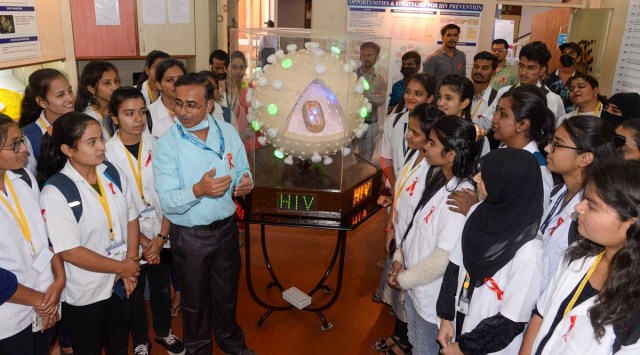📣 For more lifestyle news, click here to join our WhatsApp Channel and also follow us on Instagram
ICMR-NARI study to help ensure more equity in access to HIV viral load test
The HIV Viral Load test is an important marker to monitor the prognosis of HIV positive patients undergoing antiretroviral treatment (ART).
 Students during the ‘open day’ at the National Aids Research Institute on the occasion of World Aids Day, in Pune on Thursday. (Express photo by Rajesh Stephan)
Students during the ‘open day’ at the National Aids Research Institute on the occasion of World Aids Day, in Pune on Thursday. (Express photo by Rajesh Stephan)The Indian Council of Medical Research – National AIDS Research Institute (ICMR-NARI) in Pune is conducting a research study in association with the National AIDS Control Organisation (NACO) to ensure more equity in access to HIV Viral Load (VL) testing.
The HIV Viral Load test is an important marker to monitor the prognosis of HIV positive patients undergoing antiretroviral treatment (ART). At present, HIV viral load samples need to be processed and sent to specified laboratories within a short time frame. Centres face challenges in conducting viral load tests, particularly the ones located far from the laboratories — as in hilly or remote areas — where sample transportation is difficult, said Dr Suchit Kamble, Principal Investigator of the study and scientist at Indian Council of Medical Research – National AIDS Research Institute (ICMR-NARI).
The study will focus on different approaches to sample collection and HIV Viral Load testing in coordination with the Indian Council of Medical Research (ICMR) and NACO to see if this will improve the access to the testing, said Dr Kamble.
Dr Anupam Mukherjee, ICMR-NARI scientist, said that they have been analysing samples collected on filter paper for the viral load testing, which was a new approach that the programme will implement. The study will try to identify different samples, and strategies that could be used to serve the hard to reach and underserved populations in an improved manner.
Dr Pallavi Shidhaye, ICMR-NARI scientist, said that such approaches would be adopted by the national programme if found suitable, in a bid to ensure that 95 per cent of PLHIV on ART remain virally suppressed.
“The HIV viral load test guides the physician to identify treatment failure, if any, so that the next-generation ART drugs can be initiated in time… Patients monitored via HIV Viral Load tests are found to have better health outcomes. They have a lower rate of loss to follow-up, and have an improved adherence for ART medicines. However, there is still a need that almost 95 per cent people undergoing ART be virally suppressed,” said Dr Kamble.
The test measures the amount of HIV viral genetic material in one unit of blood; and is recommended before ART starts, six months from when the treatment starts, and once a year thereafter. For patients on second-line ART, HIV viral load tests need to be done every six months.
Ensuring that people adhere to ART and the medicines control the HIV virus in blood (HIV viral suppression) is the key to success — both at individual and public health levels, said Dr Sheela Godbole, Director of ICMR NARI. A landmark clinical trial — with ICMR-NARI being a part — revealed in 2015 that early ART can prevent a further HIV transmission.
“Following this, the World Health Organisation changed its recommendations for HIV treatment. The change was adopted by the national programme in India as a “treat all” approach in April 2017, and all HIV patients were immediately put on ART, irrespective of their CD4 count — an indicator of immune function in HIV patients,” said the director.
Meanwhile, the Maharashtra State AIDS Control Society (MSACS) has scaled up the HIV Viral Load testing among the priority groups, at around 10 laboratories at government medical colleges in the state. At present, 91 per cent (1,89,883 people) of the total 2,08,663 being tested are virally suppressed, according to MSACS data.
📣 For more lifestyle news, click here to join our WhatsApp Channel and also follow us on Instagram
- 01
- 02
- 03
- 04
- 05




























